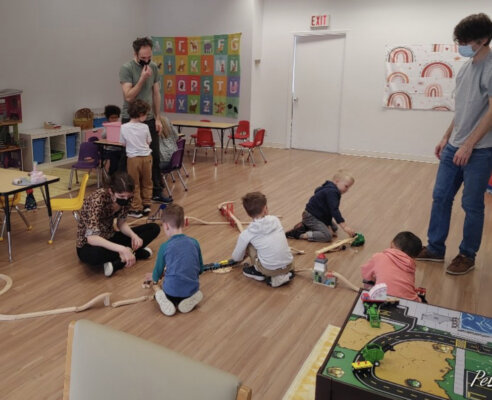May 7th is National Child and Youth Mental Health Day across Canada. This year, LDS has taken strides to include mental health wellness and advocacy into our day camp programming.
In March, LDS hosted two weeks of RISE Spring Break Camps with the support of the Government of Canada and the United Way Lower Mainland. LDS also excitedly announced our collaboration with Stigma-Free Society—a charity that aims to reduce stigma of all kinds, including mental health and learning differences. With their help and the fearless leadership of our Camp Coordinator Lindsay Underdown, LDS brought small-group, specialized programming with a focus on mental health and wellness to children with learning differences. Lindsay took the time to recap her experience and share the exciting events that occurred.
Lindsay worked with LDS as an instructor at our first-ever RISE Summer Break Camp last year and built upon what she’d learned to run the Spring Break Camps. For example, she was able to personally screen students to understand their diagnoses and areas they were actively working to address and accommodate them accordingly. Students were then grouped based on their social skills and learning outcome levels across our North Vancouver and East Vancouver locations.
The days at Spring Break Camps were split between writing activities in the morning and mental health awareness and crafts in the afternoon. For example, students worked on their writing through poetry by creating haikus about positive self-talk. Lindsay removed the pressure of written output by allowing for flexibility of expression, such as drawing or having an instructor scribe for them, but most students still chose to write.
Afternoons included mental wellness activities such as yoga, circles of control, and breathing and mindfulness exercises, as well as hands-on crafts. Students made fidget toys, Worry Pets, crafted toys to be their companions throughout the week, and painted rocks. The crafts gave students the opportunity to explore fun hobbies and activities that they enjoy, which can also reduce stress.
Each week, presentations from the Stigma-Free Society taught students about mental health and featured a guest speaker with dyslexia and anxiety. During a presentation, one of the students with dyslexia burst out, “that’s what I have!” Lindsay says, “It’s amazing how much representation matters to the kids, probably more than they realize in the moment.”
Lindsay also has dyslexia. She shares this with her students to normalize learning differences and to make them more comfortable with their own. Throughout camps, Lindsay was a positive role model by demonstrating how to handle situations where her dyslexia arose, such as casually asking instructors for spelling and moving along, not allowing it to stop her from being the best leader she can be.
“Hopefully, they can see that it’s not a big secret or something stigmatized” in her classroom, she says. As the Spring Break Camp Coordinator, she was able to provide a positive representation of an adult with a learning difference for the students. Lindsay is passionate about being an advocate with lived experience to destigmatize and create conversations around mental health and learning differences.
It’s also important for these students to be around peers with learning differences. In North Vancouver, one of the students had a recent diagnosis and was still struggling with identifying with the term. Another student at camp had a similar diagnosis but was very comfortable with their neurodivergence. Lindsay saw how by being around a peer who is confident with their learning difference, the student was able to themselves grow into themselves and started responding positively to their environment.
“Sometimes, to reduce stigma, we just have to normalize it. In some sense, education is a great way to reduce stigma around many topics, like mental health. But for these kids with learning differences … they need representation and normalization.”
Lindsay believes it’s important to start introducing and integrating ideas around mental health from a young age. In these formative years, students begin to form social bonds, beliefs, and doubts about themselves. Equipping students with techniques to deal with stress and emotions to maintain their mental health is vital to navigating their teens, which can be mentally and emotionally challenging. Children with learning differences are also at higher risk for mental health challenges, so by teaching social-emotional and well-being skills now, we can have a lasting impact on these students’ lives.
LDS has opened applications for our Summer Camps, which will feature similar mental health awareness and wellness components. If you would like to apply, visit our page or read more about the program here.
—Rie
_________________
Rie Stadnichuk (she/her) is the Digital Communications Specialist at LDS. Currently studying Communications and Economics at Simon Fraser University, she hopes to use this opportunity as a way of exploring meaningful work in the field. She is passionate about social issues and creating environments of inclusivity and open dialogue. Rie graciously lives and works on the unceded territory of the Syilx people.


